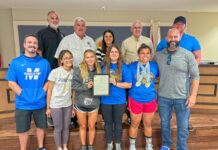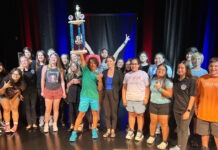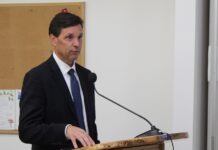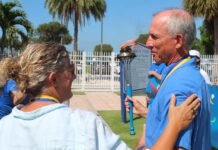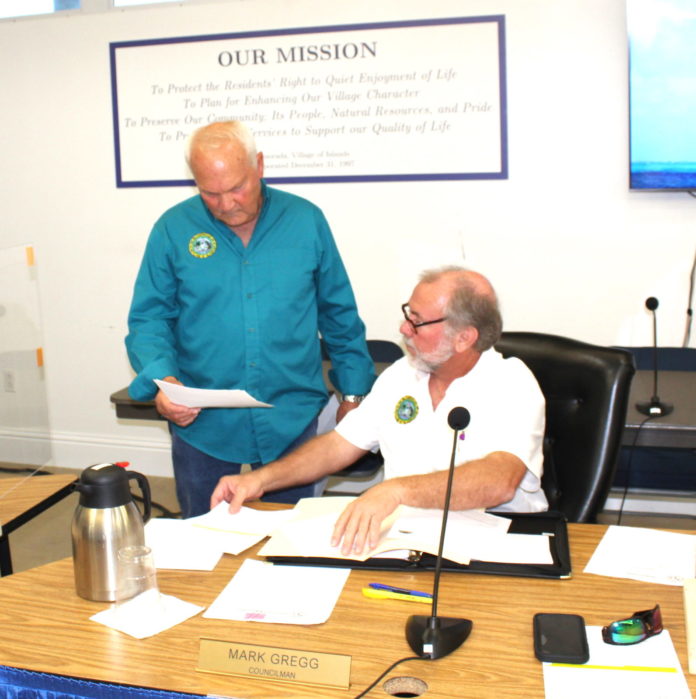
With the oath of office administered by Village Clerk Kelly Toth, new Islamorada Village Manager Greg Oravec proceeded to his seat next to the council — ready for his first meeting on July 1. A tense exchange ensued not long afterward among members of the dais and residents in the gallery over a proposal that looked to discourage discussion of quasi-judicial matters outside a public hearing.
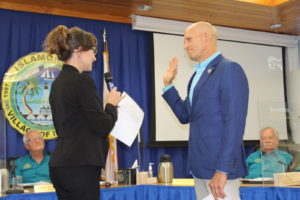
A proposal altering the way stakeholders and those interested in quasi-judicial matters communicate with council members outside of a hearing was ultimately shut down by three council members.
At the request of Councilman Mark Gregg a few months before, a memorandum was provided to council members by the village attorney that delved into a court case related to quasi-judicial procedures, known as the “Jennings Rule.” It stems from the case Jennings vs. Miami-Dade, which brought the proposition that elected officials shouldn’t discuss matters like zoning changes outside a public hearing.
A section of current village code pertaining to quasi-judicial procedures outlines means of ex parte communications, which can include written, oral or graphic communication with a councilmember that may relate to or could influence an application. It also includes visiting the site of the application, receiving expert opinions or independent investigations by councilmembers.
Direction by the council to bring forth a proposed ordinance during an April 29 meeting resulted in tense back-and-forth discussions on July 1 inside the Founders Park Community Center over an amendment that looked to prohibit oral communications with a council member on a quasi-judicial matter. Further, any communications on such matters would require a submission in writing at least two days in advance of the hearing. Gregg, an attorney of 37 years, explained that the objective was to avoid a legal problem and an ethical problem when discussing such matters outside a hearing. Gregg read a statement from the Jennings case handed down by the third district court of appeal.
“Ex parte communications are inherently improper and are an anathema to quasi-judicial proceedings. Quasi-judicial officers should avoid all such contacts where they are identifiable,” he read. “Those conversations irrevocably are tainted, so as to make an ultimate judgment of the agency unfair, either as to an innocent party or public interest that agency was obligated to project.”
“It’s wrong and unfair to do it,” he continued. “I’m just asking the council to raise the bar a little bit. It’s my desire to protect the village council and the village government and village in general from a lawsuit arising from someone saying there was a ‘Bubba deal’ or a backroom deal.”
During meetings, council members publicly disclose the communications they have with people or parties before each quasi-judicial matter is brought forth. While it removes presumption of prejudice, Gregg said, it does not have an “effect on the constitutional rights of somebody who claims they were violated because they weren’t participating in a one-on-one conversation that they had no knowledge of, they had no opportunity to listen or participate.”
“It’s so simple for us to just tell someone you’re not declined access to council. If you have something you want to share with us you think might help us in our decision or influence us, just send it in writing,” he said.
Two council members and a number of public speakers took issue with the proposal. Councilman Henry Rosenthal said the village has operated the same way with quasi-judicial matters for 20 years without problem. He said the village is abiding by state statute and the Jennings Rule.
“To have somebody meet with me and speak to me with the idea that I may be writing this down, with their approval, and then it becomes public knowledge, I can’t concede that. I just can’t,” he said. “What you say cannot be used against you. What you’re saying right now, yes, it can be used against you. I want to talk to everybody in this town and I want to have the privilege of knowing they’re protected with what they say.”
Mayor Buddy Pinder said when a property changes zoning, it’s publicly advertised. Opponents have the right to speak. Village Attorney Roget Bryan said the case and what Gregg is speaking to targets communication, regardless of the side, which happens outside of quasi-judicial hearing.
“I know there’s been a lot of stuff in this village … there’s not been transparency. I feel if we can’t talk to people about this, my whole thing is transparency. Let’s let everyone know what we’re doing,” Pinder said. “If someone wants to talk to us about it either way, for or against, we can’t do it. And we have to tell them they have to put in writing. The theory is if it’s not broke, don’t fix it.”
Councilman David Webb said the proposal tries to make it easier to be transparent and accurate.
“If you’re at (a restaurant) having a two-hour lunch with a developer who has a big project and you fade in and out of conversation, and talking about fishing half the time and the project half the time, there’s no way you’re going to be able to comply with the law and document what he said and you said,” Webb said. “If someone was opposed to that, and they happened to have seen you at (the restaurant), and that issue comes before the council … if the prejudice wasn’t cured in the way Mark wants to do, there could be a lawsuit.”
Capt. Ed Davidson said there are flaws in the proposal as it “does not address the underlying problem.” He said the simple cure would be a policy to immediately post applications, such as rezoning, that enter quasi-judicial hearings for public viewing once staff complete their initial work.
“All you gotta do is have a policy to post a forthcoming application as soon as it’s ready for review,” he said. “Then the public has all kinds of advance notice, and they can participate in negotiations over time, which they have no opportunity to do now. And that solves your real problem.”
Davidson acknowledged to council members that they only need to disclose that the conversation happened and with a brief summary, not full disclosure of the contents and substance.
There were moments of heated discussion between Pinder and Webb, as well as from the public to council members.
“I know things are very emotional, but if you see us as your enemy, I don’t know what to say,” Webb said. “I’m stunned we’re drawing conclusions that it’s cutting communication on quasi-judicial issues.”
Former councilwoman Cheryl Meads said the village attorney never asked her to disclose the content of a conversation over quasi-judicial matters.
“Sometimes I over-disclosed who I spoke to, but he never in all those years in all those quasi (matters) never once asked any of us to talk about the nature of the discussion,” said Meads, who’s also a member of the Islamorada Community Alliance. Several members from the new group spoke, including Davidson, John Kocol and Sue Miller.
A motion was made by Pinder to leave current ex parte communication procedures related to quasi-judicial proceedings in place. That passed with support from Rosenthal and a deciding vote from councilman Pete Bacheler. Webb and Gregg voted against Pinder’s motion.







